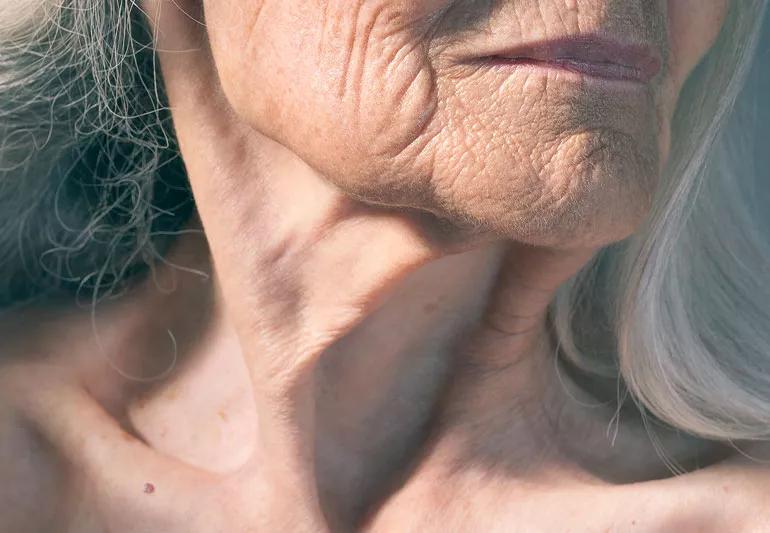Lifestyle changes, neck exercises, injections and surgery can all help improve turkey neck

It’s finally happened. Your nana’s sagging jawline has made an unwelcome appearance on your face. What’s started as a little softness under your chin has become a full-fledged gobbler.
Advertisement
Cleveland Clinic is a non-profit academic medical center. Advertising on our site helps support our mission. We do not endorse non-Cleveland Clinic products or services. Policy
“What’s known as ‘turkey neck’ is a problem with your neck’s skin, fat or underlying muscle, or a combination of the three,” says plastic surgeon Martin Newman, MD. “It’s often a sign of aging, but younger people can experience it, too. There are many ways to address it, depending on the cause and what kind of results you want.”
Dr. Newman explains why turkey neck develops and the many nonsurgical and surgical options available to improve or get rid of it.
“Turkey neck” may not be an official medical term, but people know it when they see it.
“Patients are dissatisfied with the appearance of their profile or the front view of their face because of excess skin, soft tissue and lax neck muscles,” says Dr. Newman. “These neck issues can affect your cervicomental angle, which is the angle formed where your bottom jaw meets your neck. As a result, your neck looks like it’s drooping and less defined.”
Dr. Newman says these six factors can cause turkey neck:
Advertisement
Choosing an effective turkey neck treatment depends on what’s causing it and your goals. Fortunately, there’s a smorgasbord of treatment options available. Dr. Newman breaks them down.
Dr. Newman says some people note a change in the appearance of their neck when they lose weight — but not always. It depends on the character and quality of your skin.
“If you’re young with healthy skin, your skin may retract on its own after weight loss,” he says. “But if you’re older or you smoke and your skin is wrinkled and has lost a lot of elasticity, you may not see much improvement, even after weight loss.”
Many products and minimally invasive procedures can help improve your skin’s elasticity and the appearance of neck fat, including:
Other, more potent options include:
To improve your neck’s underlying muscle quality and tone, you can try:
But buyer beware: “The brochures for many nonsurgical treatments commonly promise great results, but often provide subtle changes,” Dr. Newman warns. “And it usually takes several sessions to achieve desired results followed by maintenance.”
He continues: “While they can improve your skin’s character and quality, they all pale in comparison to turkey neck surgery. Nevertheless, many people are happy with their results.”
Surgeries that treat turkey necks include facelifts (rhytidectomy) and neck lifts (platysmaplasty). During these procedures, plastic surgeons remove excess face or neck skin and fat while tightening the skin, muscle and tissue left behind.
Advertisement
Facelifts and neck lifts go by many aliases, depending on who’s doing them and how. “Feather lift, short scar, J lift — essentially, they’re all one form of facelift/neck lift or another,” Dr. Newman says.
While surgery has more risks and recovery than nonsurgical treatments, you get a bigger bang for your buck, he adds. “Facelifts and neck lifts are the gold standard. By surgically removing the extra skin and fat (and tightening the muscles, when needed) you get instant results and a definitive fix.”
Liposuction is another effective way to single up a double chin.
Other surgeries that treat bone structure problems, like misaligned jaws and teeth, can also have benefits. “While these procedures are done less often for cosmetic reasons, they can ultimately improve your neck’s appearance,” notes Dr. Newman.
The route you go is up to you, but meeting with a reputable, board-certified plastic surgeon is the best first step. “Do your research and discuss your goals,” Dr. Newman advises. “Then they can help you achieve them.”
Advertisement
Learn more about our editorial process.
Advertisement

Using tape to smooth wrinkles may be a temporary fix, but there are still risks

The convenient option is good for touch-ups, but it shouldn’t replace your traditional sunscreen

At-home options aren’t your best bet — instead, consider noninvasive laser treatments with a dermatologist

An enzyme deficiency or rosacea are potential causes of alcohol flush

Home remedies are unlikely to cure your contagious foot fungus — and they might even make it worse

Earlobe piercings heal quicker and are less painful than cartilage piercings — proper cleaning and care are important

Some treatments may temporarily reduce the appearance of puckered and dimpled skin

Look for a UPF rating of 50+ for optimal protection against UV rays

If you’re feeling short of breath, sleep can be tough — propping yourself up or sleeping on your side may help

If you fear the unknown or find yourself needing reassurance often, you may identify with this attachment style

If you’re looking to boost your gut health, it’s better to get fiber from whole foods